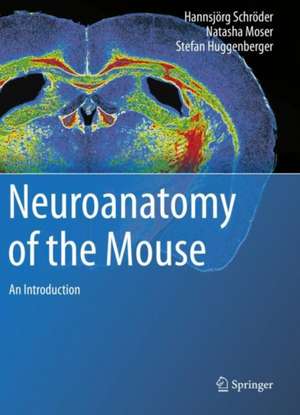Neuroanatomy of the Mouse: An Introduction
Autor Hannsjörg Schröder, Natasha Moser, Stefan Huggenbergeren Limba Engleză Paperback – 26 aug 2021
As transgenic mice are one of the most widely used paradigms when it comes to modeling human diseases, a basic understanding of the neuroanatomy of the mouse is of considerable value for all students and researchers in the neurosciences and pharmacy, but also in human and veterinary medicine. Accordingly, the authors have included, whenever possible, comparisons of the murine and the human nervous system.
The book is intended as a guide for all those who are about to embark on the structural, histochemical and functional phenotyping of the mouse’s central nervous system. It can serve as apractical handbook for students and early researchers, and as a reference book for neuroscience lectures and laboratories.
| Toate formatele și edițiile | Preț | Express |
|---|---|---|
| Paperback (1) | 506.53 lei 39-44 zile | |
| Springer International Publishing – 26 aug 2021 | 506.53 lei 39-44 zile | |
| Hardback (1) | 572.86 lei 39-44 zile | |
| Springer International Publishing – 29 feb 2020 | 572.86 lei 39-44 zile |
Preț: 506.53 lei
Nou
Puncte Express: 760
Preț estimativ în valută:
96.93€ • 103.65$ • 80.81£
96.93€ • 103.65$ • 80.81£
Carte tipărită la comandă
Livrare economică 14-19 aprilie
Preluare comenzi: 021 569.72.76
Specificații
ISBN-13: 9783030199005
ISBN-10: 3030199002
Pagini: 350
Ilustrații: XI, 350 p. 269 illus., 241 illus. in color.
Dimensiuni: 210 x 279 mm
Greutate: 1.05 kg
Ediția:1st ed. 2020
Editura: Springer International Publishing
Colecția Springer
Locul publicării:Cham, Switzerland
ISBN-10: 3030199002
Pagini: 350
Ilustrații: XI, 350 p. 269 illus., 241 illus. in color.
Dimensiuni: 210 x 279 mm
Greutate: 1.05 kg
Ediția:1st ed. 2020
Editura: Springer International Publishing
Colecția Springer
Locul publicării:Cham, Switzerland
Cuprins
Introduction.- Rodent Taxonomic and biological data.- Basic Neurohistology.- Basic Neuroanatomy/ Coverings of the CNS/ Cerebrospinal fluid system.- Microscopic anatomy of the mouse brain.- The mouse spinal cord.- The mouse brainstem.- The mouse cerebellum.- The mouse dorsal thalamus.- The mouse hypothalamus.-The mouse cerebral cortex.-The mouse hippocampus.-The mouse amygdala.- The mouse caudate putamen.- The mouse oflactory system.- The mouse circle of Willis.
Notă biografică
Prof. Dr. Hannsjörg Schröder is Head of Department II of Anatomy at the University Hospital of Cologne. His teaching focuses on the clinical neuroanatomy of humans and the comparative neuroanatomy of Rodentia for students of human medicine and neurosciences. His research focuses on topics of neurodegeneration using molecular histochemical methods.
Dr. Natasha Moser is a graduate biologist and lecturer at the Department II of Anatomy at the University Hospital of Cologne. She has been teaching macroscopic anatomy and neuroanatomy courses for many years for students of human and dental medicine as well as prospective physiotherapists. Her scientific interest focuses on neurodegeneration (Alzheimer's disease, Parkinson's disease) and nicotine receptors.
Dr. Stefan Huggenberger is zoologist and lecturer at the Department II of Anatomy at the University Hospital of Cologne. His research deals with the comparative anatomy of the senses of vertebrates, especially whales and dolphins. His expertise in this field is reflected in numerous scientific publications and several reference books.
Dr. Natasha Moser is a graduate biologist and lecturer at the Department II of Anatomy at the University Hospital of Cologne. She has been teaching macroscopic anatomy and neuroanatomy courses for many years for students of human and dental medicine as well as prospective physiotherapists. Her scientific interest focuses on neurodegeneration (Alzheimer's disease, Parkinson's disease) and nicotine receptors.
Dr. Stefan Huggenberger is zoologist and lecturer at the Department II of Anatomy at the University Hospital of Cologne. His research deals with the comparative anatomy of the senses of vertebrates, especially whales and dolphins. His expertise in this field is reflected in numerous scientific publications and several reference books.
Caracteristici
Introductory guide of basic mouse neuroanatomy Interesting for newcomers in the neurosciences, human and veterinary medicine Plethora of high resolution photos of preparations allow the reader to compare with his/her own laboratory samples Serves as reference book on the bench of any neuroscience laboratory Many extras such as practical and historical information Comparison to human anatomy and the biomedical relevance
